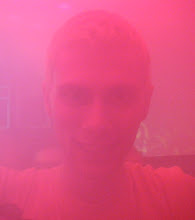
Baring in mind the last post, this post will address a rather different angle on the concept of time....
A large element of my investigation into the concept of no time comes from the spiritual philosopher Eckhart Tolle.
His book "The Power of Now", which is at world best seller, addresses the idea that human suffering is rooted in man's inability to stay focused on the present moment and not break free from "mind identification". All that may well seem like a load of mumbo jumbo and without a lot of explanation it can be hard to grasp or even after that, fully believe! However having read the book I've come to understand in detail the ideas that he is stabbing at and that could be incorporated within the thinking behind my final investigative piece.
Eckhart Tolle starts his book by giving a very explanation about how he came to be where he is today. He tells of how for most of his life he was overcome by fear and periods of suicidal depression until one evening, when he awoke suddenly in the middle of the night, he felt his usual combination of intense feelings but this time more intensely than ever. He wondered why there was any point in carrying on with this continuous struggle and felt that he couldn't live with the person he was any more. Then it struck him; if he couldn't live with himself then there must be two of him? How could that be? Maybe only one of those two were real. He claims at that point to have experienced a state of clear mind without thought.
From that point on he was a different person. He claims to have spent a few years after that in a state of constant bliss as a tramp, however he was still unaware of what had taken place that evening. It was only after a few years of training with spiritual teachers that he began to gain a degree of comprehensible knowledge on what had happened to him. He learnt that through his intense suffering his mind had withdrawn from the unhappy and fearful self, this self being the involuntary thinking mind which he declares as nothing but an illusion. He says that what was left was his true nature, free from the duality of mind identification.
Now all the above may well sound like a pile of hippy nonsense and I certainly wouldn't be surprised if it were exaggerated for the purposes of his book. That doesn't matter though as the ideas that he conveys are quite enlightening.
He begins his theory by stating that "you are not your mind". By this he is implying that the thinking mind that governs us pretty much all our lives, mostly without our control, is not who we truly are and that this involuntary thinking is in fact cutting us off from "the joy of being". He is suggesting that a state of constant peace is achievable if we learn to disconnect from the constant inner dialogue or as he likes to call it "mental noise" which is produced by the egoic mind. He declares that one's bare attention on the present moment is all we need as the mental noise is nothing more than contemplating the past and future which is where our minds pretty much always are. I'd imagine that even as you are reading this text you have a number of nebulous thoughts flying round your head, preventing you from connecting with what is right before you.
Eckhart Tolle advises that we "honour" the present moment deeply, for it is all we have. And here I really do see eye to eye with his thinking. Events only happen in the present moment, never in the future or the past. Past and future only exist so that we can reference other present moments. If we fully honour the present moment, he believes that pain and suffering are transmuted; dwelling on past pain or worrying about future pain is completely unnecessary and in fact ultimately painless when the present moment is honoured.
The remainder of the book is in effect more sides of the same coin. It goes into different scenarios where one should remain in the present moment and how to do it, one of those ways being the unintentional detachment from the thinking mind that he experienced all those years ago through intense suffering. The message is still the same though; the present moment is all we have and is also the answer to all our problems.
This way of thinking is pretty much the antithesis of the Long Now concept!

No comments:
Post a Comment